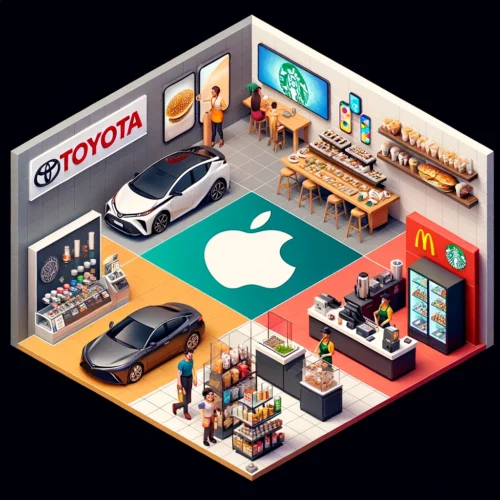Case Studies in Operations: Lessons from Industry Leaders

In the world of business, there are certain practices and methods that set successful companies apart from the rest. By examining how top-performing companies manage their operations, we can gain valuable insights into what drives their success. This article will spotlight some of these industry leaders and delve into their unique operational strategies.
- Toyota: The Toyota Production System
Background: Toyota, the Japanese automotive giant, is renowned for its Toyota Production System (TPS) – a methodology that emphasises efficiency, quality, and continuous improvement.
Lesson: The core of TPS lies in its two pillars: “Just-in-Time” production and “Jidoka” (automation with a human touch). By ensuring that only what’s needed is produced and by detecting anomalies early, Toyota minimises waste and enhances quality. The takeaway? Prioritise efficiency and quality, but always remain adaptable.
- Amazon: Mastery in Supply Chain Management
Background: Amazon’s operational success isn’t just about selling everything under the sun; it’s about delivering it almost instantly.
Lesson: Amazon’s investment in its logistics network, including fulfilment centres and advanced algorithms, ensures products are close to customers and delivered swiftly. Moreover, their focus on data-driven decision-making helps anticipate demand and manage inventory. The message is clear: Streamlining the supply chain and leveraging data can significantly elevate operational efficiency.
- Apple: Quality Over Quantity
Background: Apple’s products are synonymous with quality. Their operational strategy revolves around producing fewer items but ensuring each is flawless.
Lesson: By maintaining tight control over its supply chain and prioritising quality checks, Apple ensures that its products meet rigorous standards. Businesses should remember that in a world inundated with choices, consistent quality can be a defining differentiator.
- Starbucks: Standardisation with Personalisation
Background: Starbucks, with its outlets spanning the globe, manages to maintain consistency in its offerings while also catering to local tastes.
Lesson: Starbucks’ success lies in its ability to standardise core processes while allowing room for localization. Their centralised training ensures uniformity, but regional variations in the menu cater to local palates. The takeaway? Centralise what’s universal, but always remain attuned to local needs.
- IKEA: Efficient Design and Distribution
Background: IKEA, the global furniture retailer, has revolutionised the furniture-buying experience with its flat-pack designs.
Lesson: IKEA’s operations focus on cost-efficiency without compromising on design. Their flat-pack system reduces shipping costs, and the DIY assembly model transfers some operational aspects to the customer. The lesson here is to think outside the box—literally and figuratively—and find innovative ways to optimise operations.
- McDonald’s: The Franchise Model and Standardised Operations
Background: McDonald’s, the global fast-food behemoth, owes much of its success to its franchise model and standardised operations.
Lesson: McDonald’s ensures that no matter where you are in the world, the Big Mac you order tastes the same. This consistency is achieved through strict operational guidelines provided to all franchisees. Their focus on training and development ensures uniformity in all areas, in every branch, in any location.
Drawing from these diverse examples, we see that operational excellence varies across sectors, but certain principles remain consistent: efficiency, adaptability, and a keen focus on customer needs. By studying the approaches of these industry giants, emerging businesses can identify best practices to integrate into their own operations.






